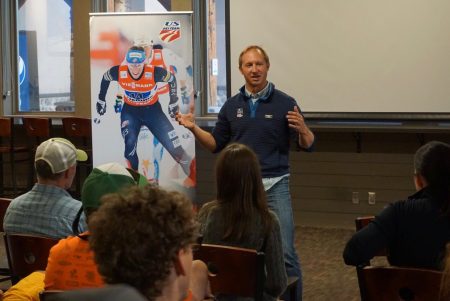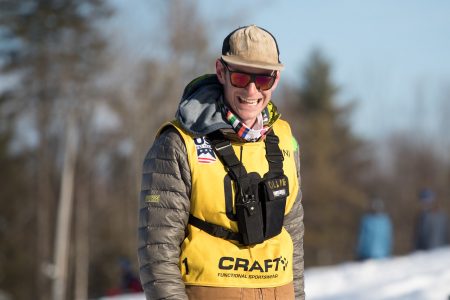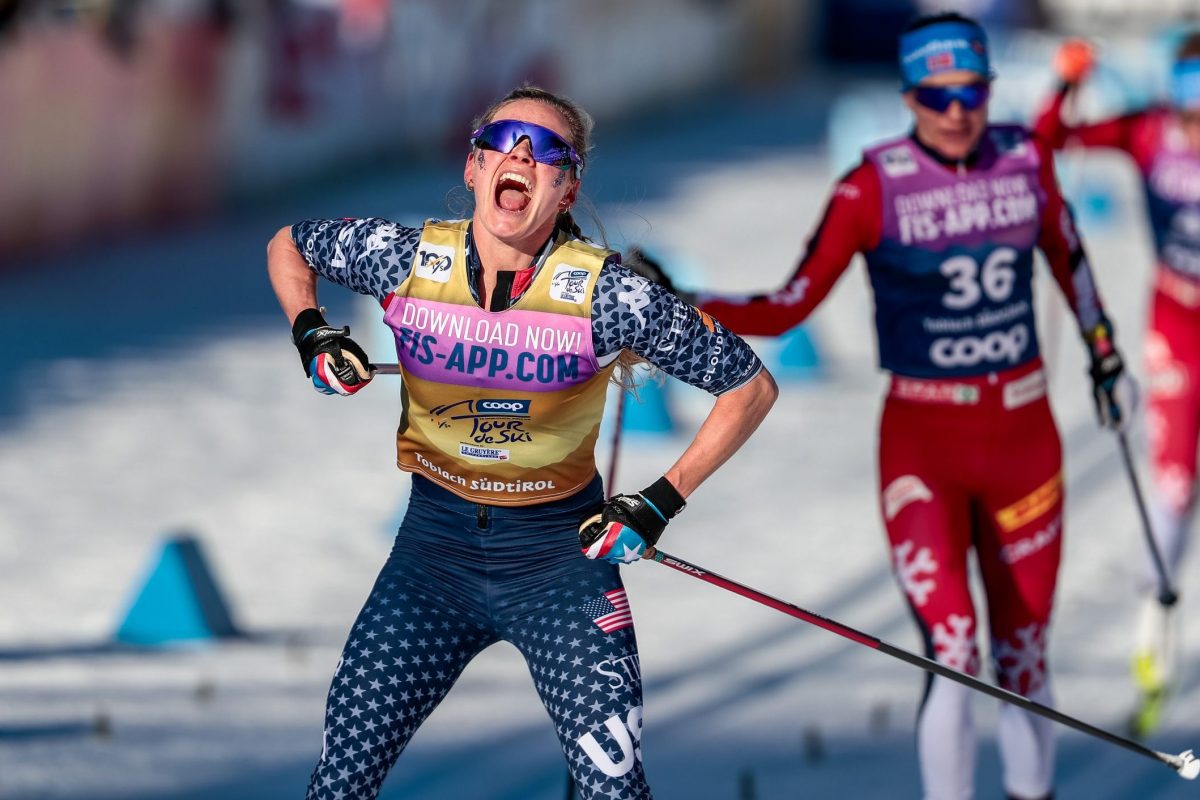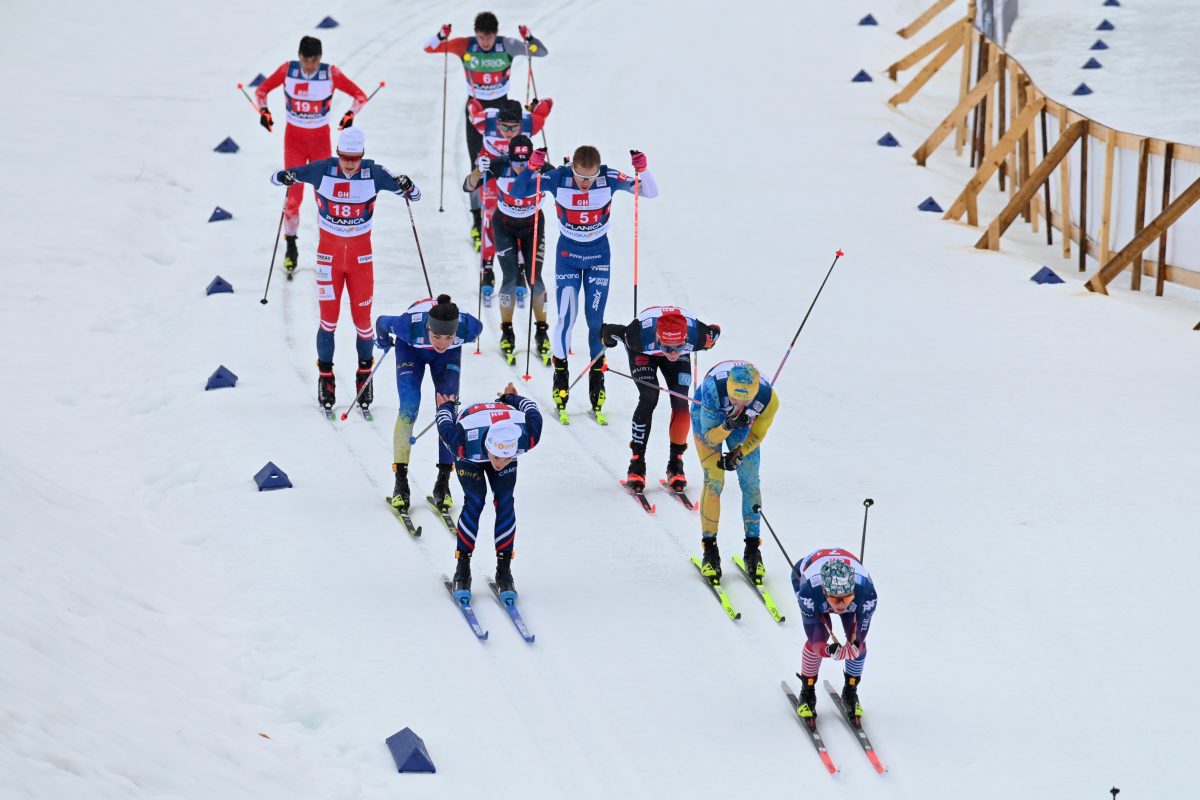
On short notice in October, the International Ski Federation (FIS) reversed its fluoro wax ban for the upcoming season. Bryan Fish, Cross Country Sport Development Manager for U.S. Ski & Snowboard, explained this was termed a “delayed implementation”. What had been expected to be a fluoro-free racing scene at the FIS level, became a business as usual wax policy for 2020-2021. In short, fluoros, C8 or otherwise, are allowed at FIS sanctioned events. The FIS fluoro ban won’t come into effect until at least summer 2021. Stay tuned.
In the meantime, U.S. Ski & Snowboard will implement a fluoro ban for all disciplines at its sanctioned events this season. “We see the future and we know that for health concerns about the product, we have implemented a fluorocarbon-free policy,” said Fish.
The policies, though opposite in their allowances, are clear. But things get muddy when events are sanctioned by both FIS and U.S. Ski & Snowboard. Fluoros or no fluoros? Testing or not? Penalize an athlete for violating the rule or not?
These are not simply thought experiments.
As part of its E-blasts, TOKO sent emails last week that raised several of those questions. It also raised awareness for an upcoming dilemma for those seeking to earn FIS points and NRL points, or National Rankings List points used for U.S. Ski & Snowboard national rankings. The TOKO emails listed all the U.S. events where fluoros are allowed. This was a comprehensive FIS sanctioned race list that linked back to the FIS cross-country race calendar.
It’s easy to see how there might be confusion. According to Toko, three of the venues on the list of FIS sanctioned races are in fact fluoro free venues: Wirth Park, the Michigan Tech Trails, and the Craftsbury Outdoor Center. FasterSkier has reported on the Outdoor Center’s initiatives in the past.

Last week, Fish said U.S. Ski & Snowboard is in the process of developing guidance on the differences between FIS and U.S. Ski & Snowboard sanctioned events. Fish also explained a document in the works would help clarify how athletes can, for example, can remove fluoros from ski bases and how skis might be tested this season at U.S. Ski & Snowboard races.
Here’s the thing: In the hierarchy of governing bodies, FIS trumps U.S. Ski & Snowboard. If a race were both FIS sanctioned and U.S. Ski & Snowboard sanctioned, a skier “caught” with fluoros on their bases could not be legally disqualified. FIS allows fluoros.
“We cannot force anybody to do anything,” said Fish. “We do sanction events and we ask people to follow the rules. … That means that in FIS events no repercussions can be handed down for an individual that competed in a FIS event and used fluorocarbon wax because that is policy.”
The Craftsbury Outdoor Center has been a key leader in the fluoro free movement. Their waxing room and trails have a zero-tolerance policy for fluoro use. That began last year.
“We’ve been preparing for nearly a year to work in a fluoro free world,” said Ollie Burruss, nordic race director at the Craftsbury Outdoor Center. “And then we got a complete reversal handed down from the International Governing Body (IGB) at the 11th hour.”
In the recent past, as the culture shifted towards fluoro free waxing, the Outdoor Center made exceptions for using fluorinated waxes on its trails. This was the case when it hosted SuperTour events last year. Coming into this season, regardless of race and sanctioning body, no fluoros. According to Burruss, that is still the plan.
A common argument against policies banning fluoros is the lack of testing. Testing is expensive. The cost-prohibitive process often allows for only a few pairs of skis to be tested at any particular event. When delegitimizing fluoro bans, many ask why have a rule that cannot be enforced?
Burruss said in places like New England no quandary exists when it comes to using or not.

“All summer, we weren’t planning on testing,” said Burruss. “And so the Outdoor Center had a policy that we wrote last year, you know about it, we made exceptions to that policy for the SuperTour that we hosted. So going into this year we still have this venue wide policy. We’re not going to test every pair of skis that come into the venue. We are going to make a set of guidelines and policies that we ask all of our guests to follow.
“We don’t have a community in New England where it’s fraught with suspicion, backstabbing, and people trying to one up each other. We really have, I think, a really tight-knit supportive ski community. And so when we planned on having FIS racing, we weren’t going to test. We were more concerned about how to safely hold an event during a pandemic. That was way more of my concern than whether or not someone was going to use fluoros.”
In Burruss’ estimation, racing at the Outdoor Center is de facto fluoro free. And for now, the Outdoor Center’s races are still listed on the FIS calendar. The Outdoor Center asks you not to use fluoros. That decision, according to Burruss, will be based on trust and a hardened value system relying on people doing the right thing, not necessarily the fastest thing.
“So basically what I’m what I’m getting at is if you violate that, if you go against that, you’re cheating,” Burruss added. “And so what we are telling people is, ‘we can’t stop you from cheating.’ We’re not going to make your cheating no longer cheating. That rubs me the wrong way. That is not the sport that I want to be a part of.”
The logic is not circuitous. It seems to trend from A to B, then C. As stated, the Outdoor Center did not have the capacity to suitably test for fluoros either way. Burruss has also not been informed by U.S. Ski & Snowboard that the ski governing body can police fluoro use at the Vermont venue with testing. So Burruss sees no contradiction for the Outdoor Center’s races remaining both FIS and U.S. Ski & Snowboard sanctioned.
Thomas Smith, Head Coach at Michigan Tech emailed that the races at the Tech venues would remain fluoro-free but would remove the FIS sanctioning.
“Through discussion and consultation amongst our MTU Race OC and US Ski Team staff, we have decided to remove the FIS sanctioning of our MTU January 2-3 Regional Championship ski race event. We will maintain US Ski & Snowboard (USSS) sanctioning of this event,” stated an email sent Wednesday morning.
“We believe the most important leadership stance for us to take as a public research institution is to ban the use of fluorinated wax at the Michigan Tech Trails to protect and promote a healthy competitive environment for our event participants, our trails, and our community. By removing FIS sanctioning from this event, this allows us to place a fluoro ban for this race event, and all race events we are hosting for the 2020-21 season. As US Ski & Snowboard has banned the use of fluorinated waxes from all USSS sanctioned events for the 2020-21 season, we will still maintain USSS sanctioning for this January 2-3 event with a fluorinated wax ban,” noted the email.
“What I will say is this, if a venue wants to be fluorocarbon-free, then we encourage them to host U.S. Ski & Snowboard sanctioned events because you can implement a fluorocarbon-free policy there and we can have a deterrent and test at that event,” said Fish.
Fish said he was concerned for athletes who might be competing at dual sanctioned events if the use of fluoros would incur no repercussions. Although Fish did not comment on this specifically, FIS events include points for scoring world rank, which is relevant in the run-up to the Olympics. And recently, U.S. Ski Team nominations have also been pinned to world rank. FIS points will matter. This only adds to the depth of the sanctioning morass.
Speaking on behalf of U.S. Ski & Snowboard, Fish was clear about the reasoning for implementing the fluoro ban now. “We want to focus on health, we want to focus on the safety of our environment and that is why U.S. Ski and Snowboard has implemented this policy and done it this year. … We want to move forward because we know it is the right thing to do. We know that fluorocarbon products that are used in some waxes are not healthy for humans and they are not healthy for the environment. We want to move forward on that piece sooner rather than later. It is clearly a hard decision to make. But I think it is the right decision.”
Fish continued that races sanctioned solely by U.S. Ski & Snowboard provide an enforceable and consistent playing field.

The expectation that clubs, coaches, and skiers toss the fluoros may have been premature. Venues like the Craftsbury Outdoor Center are ahead of the curve. As it appears, so too is U.S. Ski & Snowboard when considering the timeline to wean racing off of speed chemicals. The FIS “delayed implementation” policy is a wrench in the U.S. fluoro free movement.
Buruss would like the following message to be loud and clear if people decide to race: “These are complicated times, pay attention to the rules at each venue.” One choice is to take the approach of faith in others that Burruss puts forth. Another is to wait for the threat of testing and punishment to force a behavior change.
This all comes down in an environment undeniably tenuous as urban and rural communities experience an increase in Covid-19 cases. Either way, according to the number of FIS sanctioned races in the U.S., opportunities to dip into the chemical speed-basket this season are plentiful.
Jason Albert
Jason lives in Bend, Ore., and can often be seen chasing his two boys around town. He’s a self-proclaimed audio geek. That all started back in the early 1990s when he convinced a naive public radio editor he should report a story from Alaska’s, Ruth Gorge. Now, Jason’s common companion is his field-recording gear.


